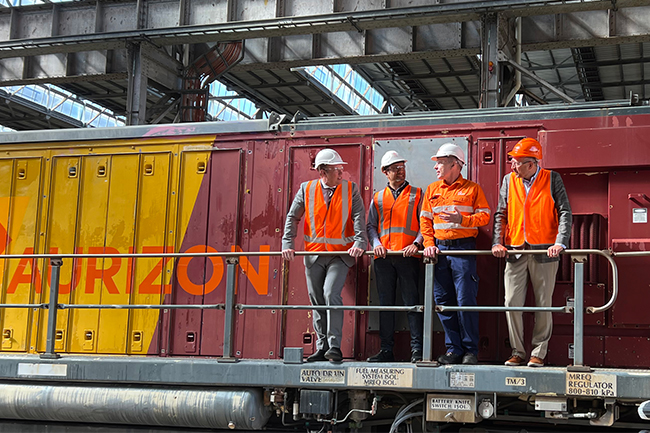Aurizon has engaged Progress Rail, part of the Caterpillar group, to retrofit one of its existing 4000-class diesel locomotives with batteries in a move which the company said has the potential to reduce Australia’s transport emissions and transform the nation’s freight supply chains.
Aurizon said the prototype will be the first freight unit to be constructed in Australia powered by batteries, allowing the potential future use of totally renewable energy sources for freight hauls. The project will also explore using re-generative energy created when trains brake or travel downhill to recharge the onboard batteries.
Aurizon Managing Director and Chief Executive Officer Andrew Harding said the project would contribute to the company’s decarbonisation initiatives with a target of achieving net-zero operational emissions by 2050.
“Modern freight locomotives using renewable energy sources have the potential to transform the nation’s freight supply chains for customers, communities and the Australian economy,” he said. “Not only will this dramatically reduce the carbon footprint for our freight transport needs and the community in general, but it will also provide a significant competitive advantage for Australian industries and exporters in global markets.
“Delivering high-quality Australian products for export across zero or low-carbon supply chains will be a win- win for Australian companies and Australian communities.”
The train is being built at Progress Rail’s Redbank facility in south-east Queensland and will be designed as a heavy-haul freight locomotive, capable of working across Aurizon’s national rail footprint.
The prototype is expected to feature similar battery technology to that provided in Progress Rail’s EMD Joule electric locomotive which the company said has battery capacities up to 14.5 MWh, and a run time of up to 24 hours on a single charge.
Progress Rail said the design phase and preliminary work on the retrofit has commenced at Redbank with construction of the locomotive expected to be completed by early 2023, with on-track trials commencing in the first half of 2025.
Aurizon said the charging infrastructure on the selected Australian rail corridor will be completed in conjunction with the locomotive project with the University of Queensland and Central Queensland University commissioned to undertake modelling work and research on emerging battery technology, network infrastructure and charging facilities required to provide renewable electricity to the locomotive batteries.
This content is protected by copyright and may not be reused. If you want to cooperate with us and would like to reuse some of our content, please contact: editors@pv-magazine.com.









By submitting this form you agree to pv magazine using your data for the purposes of publishing your comment.
Your personal data will only be disclosed or otherwise transmitted to third parties for the purposes of spam filtering or if this is necessary for technical maintenance of the website. Any other transfer to third parties will not take place unless this is justified on the basis of applicable data protection regulations or if pv magazine is legally obliged to do so.
You may revoke this consent at any time with effect for the future, in which case your personal data will be deleted immediately. Otherwise, your data will be deleted if pv magazine has processed your request or the purpose of data storage is fulfilled.
Further information on data privacy can be found in our Data Protection Policy.